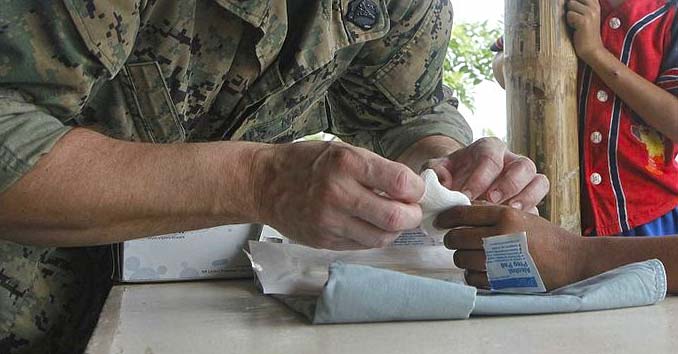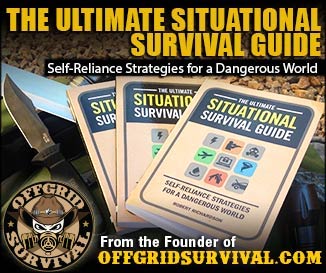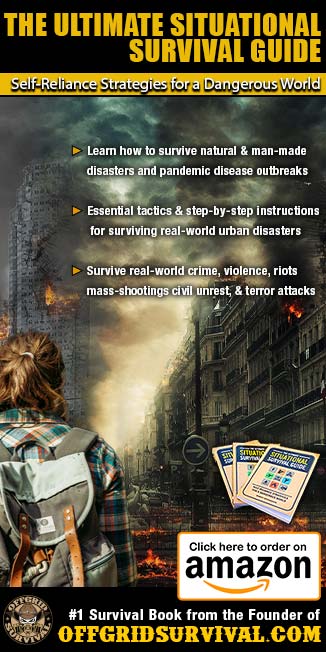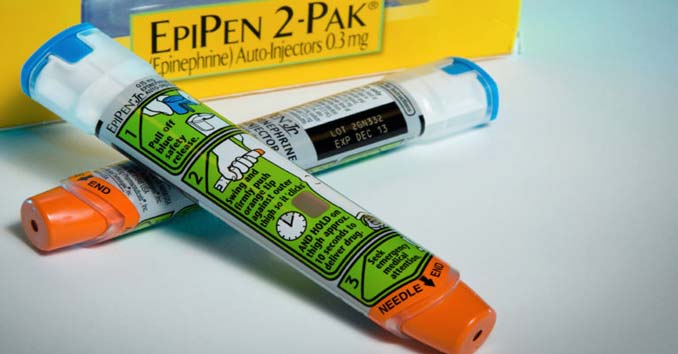For those with health issues, preparing for any type of disaster or crisis can be quite a challenge. I receive a lot of email from worried people, asking how they can prepare for disasters while at the same time dealing with a wide range of medical issues and health problems.
I’m not going to sugarcoat it; if you have significant health problems, you’re going to be at a major disadvantage. You’re going to have to work even harder than most people to be prepared to face the challenges associated with surviving a crisis or disaster situation.
I encourage you not to give up. I talk to a lot of healthy people who have already given up because they fail to put plans in place to protect themselves and their loved ones from the very real threats and disasters that are out there. The mere fact that you are reading this puts you ahead of most people. Even if you have health issues to contend with, your willingness to do something says a lot about your mental ability to cope with a crisis. It’s this will to survive that is often the most important factor during a survival situation.
Things you can do to prepare for disasters when you have medical problems.
Stock up on medication.
If you or someone in your family depends on any medication or medical device to stay alive, you need to make sure you have an ample stockpile stored up and ready to go during a disaster.
- Ask your doctor to give you an extra prescription. While some doctors may be reluctant to give you extra medication, it’s probably not a bad idea to discuss your concerns with your doctor.
- Find out if there are supplements to your medication that you can take to extend your supply. During times of crisis, you may have to find alternative ways to manage your health. Start researching what you can do to build your immune system, or supplement your medications during an emergency.
- Ask your doctor for samples at every appointment. Doctors often have loads of samples which they get for free from pharmaceutical companies looking to push their brand. These samples can be added to your emergency stockpile without costing you a cent.
Stock up on medical supplies.
Take an inventory of everything you use on a daily basis, and then start to build a stockpile of those supplies and a set of backups for your critical medical devices.
- If you rely on it, back it up. Consider adding backups of all your medical supplies to your preparedness stockpile. Things like extra eyeglasses, hearing aids and hearing aid batteries, wheelchair batteries, and oxygen should all be considered.
- Build an Emergency Medical Kit: Everyone, no matter what condition their health is in, should have an emergency medical kit on hand at all times. What goes into your kit will vary depending on your state of health, but having one is an essential part of being ready.
Find out what Emergency plans your doctor has in place.
If you undergo routine medical treatments at a hospital, talk to your doctor about what emergency plans they have in place. Work with them to identify back-up service providers that you can incorporate into your personal emergency preparedness planning.
Learn how to manage your condition.
While your ability to manage your health without medical assistance will depend on your unique situation, start looking into what you can do to manage your medical issues without a doctor. During a crisis situation, the more you know about treatments, and alternative ways to manage your health, the greater your chances are of surviving a disaster.
- Ask questions at every appointment. Ask your doctor what you should do during an emergency where medical help and medication may be hard to find. Ask, for example, if you can stretch out your supply of medication by skipping every other dose, or cutting your pills in half.
- Look into emergency medical classes. Find out how you can treat yourself or your loved ones during an emergency where medical assistance may not be available. The Red Cross and a lot of local hospitals offer a number of different life-saving medical courses to the general public.
- Research, research, research. You are your number one advocate when it comes to your health, take the time to research and learn everything you can about your illness or medical conditions.
Keep detailed records with your emergency supplies.
Ask your doctor for copies of all your medical records, medications, and treatment plans. During a disaster, where you may have to be treated by someone unfamiliar with your condition, these records can help first responders and doctors better treat your condition.
- List the names (including generic names) of any prescription medications you’re taking and the doses.
- Have detailed records of past treatments and current treatment plans.
- Have a list of all emergency responders, hospitals and treatment centers in your area.







Prepping while keeping my wife’s anxiety disorder in mind is rough. We experimented with herbal and organic remedies and found a few that worked. We now add a few simple teas to our preps in case the medicine runs out.
I’m on chronic pain medication and not sure my doctor would give me an extra prescription, especially since things will change in October. I have cut back considerably but do you have any other suggestions?
Pain mostly comes forth due to inflammation in the body. tho i am no doctor, i have tried with great results, keeping my body alkalized with more green juices, stopped most sodas,very little coffee lots of warm lemon water too.
I know this is an older post but what I did was fudge my pain levels and the perscribed more meds than I need. So now I have a nice stock pile. Just make sure you take the meds the day before your dr appointment so they can see the meds in your system. I also live in California so access to ‘alternative’ medicine is easy if need be.
Definitely try to manage and reverse whatever you can without reliance on the systems. I’ve seen too many diabetics reverse their disease through diet and exercise to feel sympathy for those that chose to have it.
Not all of us “choose” to have the disease. We do what we can to control it.
It always irks me when those who don’t suffer from it say how easy it to deal with.
Those of us who are type 1 did not “choose” to be diabetic. This is not something you get from eating too many cheeseburgers.
but Dean those types of foods only aggravate the issues type 1 or 2
James, I suggest you look into Type 1 (juvenile onset) diabetes. When you do you will find that it cannot be controlled by diet alone. Diabetics with type 2 can often reverse their disease but not type 1.
#dosomeresearchbeforeshootingoffyourmouth
Anyone have any tips for asthmatics? I’d like to at least stock up on inhalers, but my doctor seems reluctant to write refills into my inhaler prescription. I’ve lived with asthma for 30 years, and docs seem reluctant to allow me to do what i know is right for me. Makes me think doc just wants my $$$.
Get guaifenesin. It is Mucinex. But, the generic is cheaper. Don’t get the ones with other ingredients for fever or allergies.
The issue we’ll run into is that my wife has MS. They’re very tight with medication and it has to be shipped to the house on a timed basis. As far as I know there is no other way to get my hands on extra meds, plus hers need refrigerated.
Hi Tim
My wife has MS (diagnosed in 1997). She has been using Betaferon (Interferon Beta 1A) Initially it was delivered in a polystyrene box but for the last few years it just comes in a standard cardboard box. I ended up building a retaining wall out of all the polystyrene boxes. We have been helped by our local MS society. I would imagine that there would be something like that where you are. If you are seeing a Neurologist ask him to let you know of any alternative to your wife’s current treatment.
Best wishes.
Has your wife, checked on the new pills that has been comeing out for MS, I also have MS and I’M on a pill (Gilenya). maybe that may be something for her to look into, best of luck.
again more whole foods more greens could only help to nourish your body and help the inflammation. plus do you or you wife sew? now would be a great time to find or make a little ditty bag that has pockets that can be used for the cooling packets to wrap insulin’s or other meds that need to be cooled.
Hi everyone, ai am atbyroid cancer survivor have had a double thyroidectomy and take daily thyroid replacement hormones. The dosage is closely monitored and the hormone is very sensitive to light and temperature changes. I have to take a non-synthetic type as I am allergic to the synthetic. I can survive on a lower dose although it greatly effects my ability to sleep as well as not bring able to control my temperature and moods. I am looking for any considerate and helpful suggestions.
I also am a thyroid cancer survivor with no thyroid gland. I find many ways to deal with hypothyroidism, but that presupposes that one still at least HAS a thyroid gland. We don’t – we are athyroidic (no thyroid). Even though there are many plant-derived hormone replacement products, there really isn’t one for people like us. The best I’ve found is to ingest animal thyroid glands in dessicated form. Not very doable! I am hoping that someone has a solution, or my long-term survival has been thus efficiently axed.
I have been reading up on therapeutic grade essential oils. they say they are great for all issues. might want to check into them
Are there natural remedies for high blood preasure. My doctor plays by the rules and refuses to give any perscriptions extra. In addition i would like to stock up on some antibiotics. Are there any places to purchase meds like antibiotics maybe from other countries. If so how do you contact them, its almost like our govt WANTS you to die in a crisis.
Beet root powder, greens powders, garlic, hawthorn berry, cinnamon, etc :-)
I have glasses and in a longterm emergency if my glasses broke.would I go blind?
No, you won’t. It will be very annoying though. In a pinch, you can make ’emergency all-distance glasses’ by poking a needle through a piece of cardboard and looking through the hole.
Many of the drugs currently prescribed to people are mirrored after things found in nature (stating mirror red yeast rice). Study the herbs out there and then talk to your doctor about how to use them in an emergency.
Also some generic meds (basic insulin) can be purchased without a prescription. Once again talk to you doctor to see how to make the substution.
Chronic conditions are no fun in an emergency but with a little planning can be managed.
Also consider checking out events like Hurricane Workshops. Often times there are booths or presentation (llike the one I give for Diabetics) that may have useful hints and information.
I have takyamus disease which is a rare disease that causes inflammation to the main arteries I have to go hospital and receive infusions every four weeks along with a bunch of meds any suggestions.